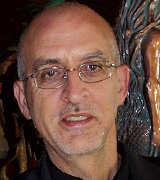- “La Parisienne” Goes to the Opera: Maria Callas as Priestess
- Over 40 US Policymakers Commemorate the 50th Dark Anniversary of the Turkish invasion in Cyprus at 39th Annual PSEKA Conference
- Remembering The Turkish Invasion of Cyprus and The Fight to Flee with Famagusta Native and Founder of Aktina FM Elena Maroulleti
- Marc Chagall And Greece: A Love Story
- $17 Million AHEPA Gift Will Open Doors For A Generation Of Students
SMALL-TOWN GREEK AMERICA

by Dimitri C. Michalakis
We forget sometimes how Greeks have permeated not just the big cities where they put down roots in ethnic enclaves, but also the small towns of this country.
Weirton, West Virginia had a vital community which produced some eminent men, including industrialists John Rangos and Mike Psarros, who talked about their time growing up in Weirton as the most formative of their lives.
In our current issue, Paul Lountzis talks about the values he learned growing up in Reading, Pennsylvania and the example of his immigrant parents, who, his father admitted to him once, “Raised five kids with $30 in the bank.”
But they did, and created a community, that still resonates with the native sons and daughters who went on to bigger and greater things.
I grew up in Chicago, not a small Greek enclave, but like most Greek American cities, divided into a patchwork of parishes. We were in the suburbs and were considered middle class. The members of the school board at our parish school were professors and lawyers and businessmen. Our houses were solid brick, and every year the church raffled off a Cadillac that sat on the sidewalk outside the church on Sunday to temp the willing with its fins—and most years a rich Greek would buy up all the tickets and add yet another Cadillac to his stable.
But it was a solid world: every store across the street from my father’s school was Greek, from the Sinclair gas station anchoring one end of the block and waving its inflatable green dinosaur, to the Mouhelious Greek grocery store in the middle of the block (which always smelled of oregano and cheese and olives in brine and featured skinned sheep for the holidays with their tongues hanging out and their eyeballs bulging), to the Greek repair shop with its cave-like car bays anchoring the other end of the block.
We would leave Sunday school and linger over the beautiful grounds of the Assumption Church, with its green dome dominating the street, and run across the street to the candy store to gorge on candy and eavesdrop on the men talking about politics—both local and overseas. In fact, one of the biggest talkers later became a minister in Greece, and visiting dignitaries—like the Patriarch Athenagoras—brought out the whole community, which couldn’t fit in the church, so the street spilled over with Greeks accepting his blessing (and giving my father a hug that tickled with beard and smelled of incense).
My best friend lived not far from the house of the proistamenos, Fr. Thalassinos, only a few blocks from the church, and his presvytera was the formidable lady with the wavy hair in a bun and nylons with lines in the back who would march up and down the aisle during Sunday school and lead us in singing the hymns: Jesus loves us, yes, I know, cause the Bible tells me so!
And for the ultimate community event of Holy Week, I would put on my suit, my one suit from Robert Hall, with my perfect attendance wreath on the lapel, and during the long hours of service I would stare up in wonder at the stained glass windows all around us going dark in the night, and the dome of God in heaven, and the panel of Christ rising from his tomb–and I would count out the Evaggelia being read by the candles being snuffed out on the candelabra, until the very last one was read, and then we would march out into the night in a community of people that had shared the night together.
The memories are still with me.











0 comments